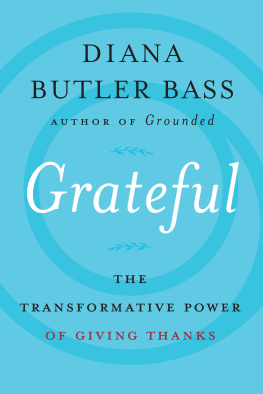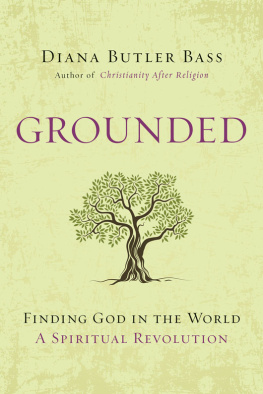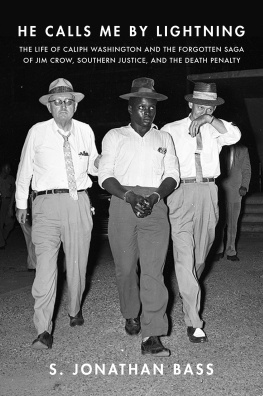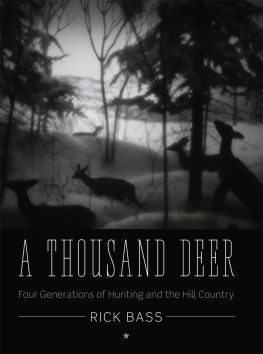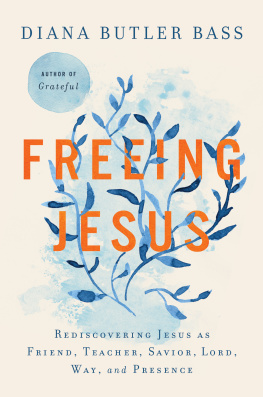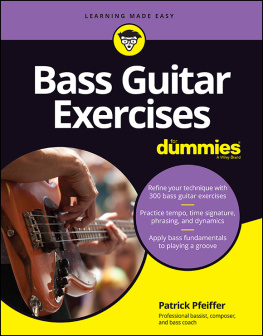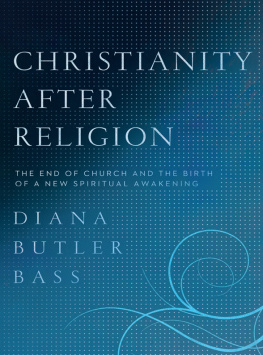Bass - Grateful: the transformative power of giving thanks
Here you can read online Bass - Grateful: the transformative power of giving thanks full text of the book (entire story) in english for free. Download pdf and epub, get meaning, cover and reviews about this ebook. City: New York, year: 2018, publisher: HarperCollins, genre: Religion. Description of the work, (preface) as well as reviews are available. Best literature library LitArk.com created for fans of good reading and offers a wide selection of genres:
Romance novel
Science fiction
Adventure
Detective
Science
History
Home and family
Prose
Art
Politics
Computer
Non-fiction
Religion
Business
Children
Humor
Choose a favorite category and find really read worthwhile books. Enjoy immersion in the world of imagination, feel the emotions of the characters or learn something new for yourself, make an fascinating discovery.
- Book:Grateful: the transformative power of giving thanks
- Author:
- Publisher:HarperCollins
- Genre:
- Year:2018
- City:New York
- Rating:4 / 5
- Favourites:Add to favourites
- Your mark:
- 80
- 1
- 2
- 3
- 4
- 5
Grateful: the transformative power of giving thanks: summary, description and annotation
We offer to read an annotation, description, summary or preface (depends on what the author of the book "Grateful: the transformative power of giving thanks" wrote himself). If you haven't found the necessary information about the book — write in the comments, we will try to find it.
Bass: author's other books
Who wrote Grateful: the transformative power of giving thanks? Find out the surname, the name of the author of the book and a list of all author's works by series.
Grateful: the transformative power of giving thanks — read online for free the complete book (whole text) full work
Below is the text of the book, divided by pages. System saving the place of the last page read, allows you to conveniently read the book "Grateful: the transformative power of giving thanks" online for free, without having to search again every time where you left off. Put a bookmark, and you can go to the page where you finished reading at any time.
Font size:
Interval:
Bookmark:
To Roger Freet
Thank you for your encouragement, your friendship,
and your unfailing belief in the power of words.
For all that has beenthanks.
For all that shall beyes.
DAG HAMMARSKJLD
Let gratitude be the pillow upon which you kneel to say your nightly prayer.
And let faith be the bridge you build to overcome evil and welcome good.
MAYA ANGELOU
Gratitude is the memory of the heart.
FRENCH PROVERB
I pulled the card from the envelope, appreciatively fingering its velvety thickness. It was formal and traditional, the sort one rarely sees anymore, with a single word embossed on the front: Grateful .
I opened it and read, Thank you for the lovely thank-you note!
I read it again, just to make sure. It was a thank-you note for a thank-you note.
Now what?
Do you send a thank-you note for the thank-you note received for sending a thank-you note? Was there a rule for this? I have never been very good at these things. Writing the original note was hard enough; I considered it a mannerly triumph. But what happens when someone thanks you for saying thanks? Should you return thanks again? This could go on forever, I sighed. I held the kind note in my hand, not knowing what was right or proper. Saying thank you can be so complicated.
Suddenly, I felt a bit like that little girl whose mother forced her to write thank-you notes for Christmas and birthday gifts. I was not good at it. I did not want to do it, and I did not know what to say. But when she sat me down and insisted, I wrote, usually scrawling Thanks and Love, Diana in tipsy letters on the note cards supplied for the exercise. I must have complained quite a bit, because one Christmas an etiquette book showed up as a gift under the tree. A bookmark was not so subtly placed before the section How to Write Thank-You Notes. I got the point, but I did not improve in practice.
Years later, the struggle over thank-you notes repeated with my own daughter. Although I had not been good at it, I hoped she would be. No such luck. She resisted and complained just as I had at her age. I bought her fancy cards and personalized stationery, supplied her with colored pens and cute stickers, hoping all might inspire notes of gratitude. It did not work. She utterly refused to write. However, no Miss Manners showed up under the Christmas tree. Instead, I prompted her to call gift givers and send thank-you e-mails. We had some success with electronic forms of expressing gratitude, but only minimally so. I gave up. When I stopped resorting to threats and etiquette shaming, she stopped writing thank-you notes. Is there DNA for ingratitude? For daughter wound up like mother, and I felt bad that I had not done better as a parent.
I have always struggled with gratitude. I want to be grateful, but too often I find myself with no thanks.
Oddly enough, whatever my shortcomings in practice, the concept of gratitude still captivated me. Although I rarely sent thank-you notes as a girl, I collected pretty stationery designed for that very purpose. I loved when people brought my mother thank-you gifts of flowers or food after she volunteered at church or hosted a dinner party. When I was a teenager, I tried to memorize every verse in the New Testament about thanks. It seemed the Christian sort of thing to do. Of the dozens of mentions of gratitude in its pages, I managed to memorize only one: In everything give thanks (1 Thess. 5:18, KJV ). I proudly quoted it to a church friend. She replied, But thats only half the verse! Thats not a very high success rateone-half of one verse on thanksgiving.
I remember listening to a guest on TheOprah Winfrey Show discussing the power of gratitude to change ones life. A sort of spiritual longing arose in my heart. I felt inspired and decided to keep a gratitude journal. That lasted less than a week. On another occasion, I embarked upon the noble project of making a moment of gratitude part of our familys bedtime ritual. We did it once. And then there is that painful Thanksgiving dinner exercise in which no one eats until everyone at the table says something they are thankful for. It is supposed to remind us about the real meaning of the holiday. But it feels more like a turkey hostage situation than a spiritual exercise in grace. I feel thankful when it ends.
You can only attempt something for so long before you give up. By the time I received the thank-you note for my thank-you note, I had consigned myself to life as a gratitude klutz.
I confess. I gave up on thanks. I tossed the Grateful card on a pile of correspondence. I never replied.
F LUNKING G RATITUDE
In late 2015, I was working on a project about spirituality and character. A pile of books sat on my deskabout virtues like charity, joy, kindness, patience, and thankfulness. Next to them was a survey examining American religion and spirituality. I thumbed through its pages, and a question caught my attention:
How often do you feel a strong sense of gratitude or thankfulness? Would you say at least once a week, once or twice a month, several times a year, seldom, or never?
Interesting, I thought. Then I read the answer: an astonishing 78 percent of Americans responded by saying that they had felt strongly thankful in the last week!
A wave of guilt engulfed me. I was not sure I was one of them. I shoved the survey aside.
My glance fell on the other books. Half of them had the word gratitude, thanks, or thankfulness in the title. The volumes seemed to stare back at me, their cheerful bright covers adorned with pictures of flowers and smiling faces. Several promised happiness, healing, success, or personal fulfillment. The collection was a self-help heap of thanks, a perky pile of gratefulness. The stack seemed to scold me, wagging accusing authorial fingers in my direction, as if knowing I had flunked the gratitude exam. I half expected my late mothers ghost, straight from Christmas past, to appear and regift me with that etiquette guide.
What kind of horrible person was I? Somehow, gratitude klutz no longer seemed adequate. Was I an ingrate? An ugly word. No one wants to be an ingrate. But I realized that I rarely experienced or thought about gratitude. Did I truly not have moments of gratefulness? Or did they bypass me without recognition? I did not know.
Whatever the case, that 78 percent made me feel lonely.
And curious. I mentioned the survey to several friends. Their responses were remarkably similar to mine: What? Eight out of ten? People dont seem that grateful.
One of those friends is a sociologist. I dont believe it, I insisted to him. Nearly 80 percent of Americans say they feel deep gratitude at least once a week? Could that possibly be true?
Gratitude researchers claim that if we are grateful, we are happier and more content, that there is a social consequence to thankfulness. I dont see that, I said to my friend. Other data say we are angry, discontented, and unsatisfied. And our politics isnt exactly based in gratitude. Thank you doesnt seem to be our strength right now.
He chuckled and then explained: Whenever eight in ten Americans answer the same way on a question, the question becomes less valuable for analysis. It also makes you suspect that there is serious social desirability bias going on here.
A social desirably bias occurs when people answer a question in a way that makes them look good to themselves or others, that matches the image of the person they aspire to be. In other words, that high percentage might indicate there are many people, like me, who know that gratitude is good and want to be grateful, to feel gratitude, or to be seen as thankful people. We believe gratitude is virtuous. We might experience gratitude in a given moment and say to a pollster, Yes, I felt thankful. But inwardly, we know how difficult it is to practice and sustain thanksgivingto live a truly grateful
Font size:
Interval:
Bookmark:
Similar books «Grateful: the transformative power of giving thanks»
Look at similar books to Grateful: the transformative power of giving thanks. We have selected literature similar in name and meaning in the hope of providing readers with more options to find new, interesting, not yet read works.
Discussion, reviews of the book Grateful: the transformative power of giving thanks and just readers' own opinions. Leave your comments, write what you think about the work, its meaning or the main characters. Specify what exactly you liked and what you didn't like, and why you think so.

